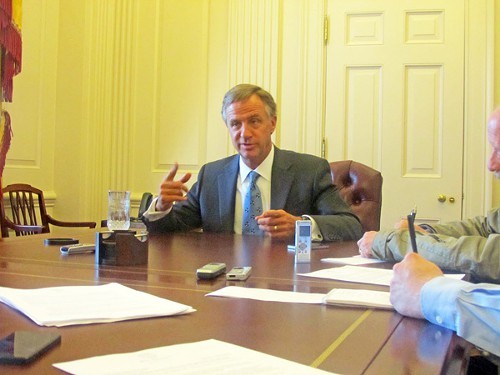
- JB
- Haslam facing the press after announcing decision
NASHVILLE — After months of delaying his answer on whether to accept an expansion of TennCare, the state’s version of Medicaid, with funds provided by the Affordable Care Act, Governor Bill Haslam finally had something to say on the issue Wednesday, and it was a very hedged No.
Haslam first spoke at length to a joint morning session of the General Assembly, unveiling what he called “the ‘Tennessee Plan’ for Health Care Reform. He then retired to the conference room of his Capitol office, where he faced questions from reporters in shifts — dealing with print reporters first, then members of the broadcast media.
The “Tennessee Plan,” as outlined by Haslam in his remarks to the General Assembly and in an accompanying press release would “leverage the available federal dollars to purchase private health insurance for Tennesseans who would not otherwise have access to coverage.”
The problem, Democratic legislators responded, is that there will be no new “available federal dollars” to “leverage,” short of accepting expansion under the terms of the Act. “What the governor would like to do, to appease his base, is have access to the Obamacare dollars without subscribing to the Obamacare plan. I don’t see how he can do that,” said state Rep. G.A. Hardaway (D-Memphis). “He seems to be asking for a waiver, but he has nothing resembling a business plan, and, without that, he won’t get it.”
“I think the result will be disastrous,” said state Rep. Mike Turner (D-Nashville), the Democratic caucus leader in the House.” I think with workers’ comp [legislation] and this, we’re setting up to become the sickest,unhealthiest state in the nation.”
As might be expected, Republicans were more sanguine about te consequences of the governor’s decision. State Rep. Jim Coley (R-Bartlett) called Haslam’s action “prudent,” though he said he also thought the governor should not be hindered in pursuing further negotiations with the Obama administration.
As with any complex governmental schema, the devil is in the details as to how results equivalent or nearly so to what was offered the state by Obamacare can be achieved by Haslam’s ad hoc solution. In the case of the “Tennessee Plan,” those details are devilishly vague.
As summarized in information sheets distributed along with the Governor’s remarks, the plan would:
— Leverage available federal dollars to purchase private health insurance for Tennesseans up to 138 percent of the federal poverty level who don’t have access to health insurance, which would translate to 175,000 more insured Tennesseans;
— Allow co-pays for those who can afford to pay something;
— Include a definitive circuit-breaker or sunset of the plan that could only be renewed with the General Assembly’s approval;
— And reform the payment structure for providers so they are compensated for health outcomes, not just based on services performed.
— And reform the payment structure for providers so they are compensated for health outcomes, not just based on services performed.
Haslam faced sharp questioning from reporters in his Conference Room session. Asked if he wasn’t just “kicking the can down the road” and forsaking an immediate $1 billion in federal funding, the governor said, “We’re not giving up on our version of what we’re asking for.”
He said that, “Two days ago we were almost there,” but, after a Monday evening conversation with federal Health and Human Service officials, “we did not get our questions answered.”
Asked if he hadn’t merely found an expedient way to dodge potential criticism from Republican legislators who would have vehemently opposed acceptance of Medicaid expansion under the federal Act, Haslam acknowledged that acceptance would have meant “a very uphill climb.”
With expansion of the Medicaid rolls under the Affordable Care Act, the federal government would have paid 100 percent of the expenses of expansion for the first three years and no less than 90 percent thereafter. Even governors as conservative as Rick Scott of Florida had accepted the formula under the implied option of bailing out of the program when the three years were up.
Haslam said he did not regard such a temporizing as useful.
On the day of the governor’s announcement, the lobby of Legislative Plaza was filled with signs and exhibits from various groups taking a position on Medicaid expansion, most of them urging acceptance.
Meanwhile, state Senator Brian Kelsey (R-Germantown) promised to continue being a “watchdog” to prevent any further prospect of Medicaid expansion under the Affordable Care Act. Though there had been conjecture that he would shelve a bill (SB 84)he has introduced to that end, he spoke for it in the Senate Commerce and Labor Comittee later Tuesday and asked for, and got a favorable 7-2 vote. The two no votes in committee were from Democrats Charlotte Burks of Montery and Reginald Tate of Memphis.
Senator Burks wondered out loud if the legislature had the authority to prevent action by the governor on TennCare, which has traditionally been the administration’s province. Kelsey answered that the General Assembly had surrendered control of too many governmental areas to the executive branch and that his bill was intended to reclaim this one administrative corner.
His bill had previously been amended by Sen. Mark Green (R-Clarksville) to acknowledge that the governor might continue negotiations with the Obama administration but stipulated that any agreement had to be approved by the General Assembly. Kelsey did not disapprove, and the bill was approved in that form and forwarded on to the Senate Finance Committee.
VIDEO of Sen. Kelsey vowing eternal vigilance against Medicaid expansion:
MTK